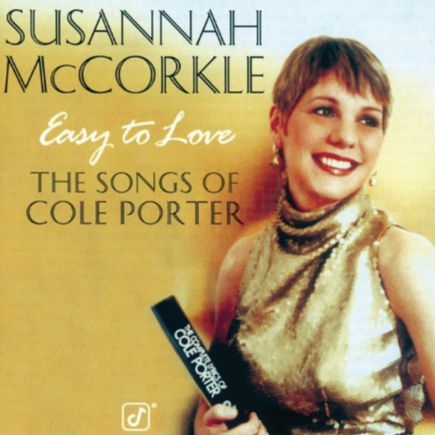Easy to Love: une élégance à la croisée du jazz et de Broadway
Genèse contrariée et trajectoire scénique
Écrite en 1934 par Cole Porter pour William Gaxton dans la comédie musicale Anything Goes, Easy to Love connaît d’emblée un destin singulier. Jugée trop exigeante vocalement par son interprète pressenti, la chanson est écartée du spectacle avant même sa création. Porter la retravaille ensuite pour le film Born to Dance en 1936, où elle est chantée par James Stewart aux côtés d’Eleanor Powell et de Frances Langford. C’est dans ce cadre cinématographique qu’elle adopte son titre abrégé, avant de retrouver son intitulé complet – You’d Be So Easy to Love – lors des reprises scéniques de Anything Goes en 1987 et 2011.
Écriture musicale et raffinement formel
Le morceau illustre avec précision l’art d’écriture de Porter, fondé sur une élégance sans ostentation. La ligne mélodique, souple et immédiatement mémorisable, se déploie sur une architecture harmonique subtile, ponctuée de modulations discrètes. Cette construction offre un large espace d’interprétation, permettant aux chanteurs comme aux instrumentistes de modeler le discours sans jamais en altérer la clarté ni l’équilibre général.
Entre Broadway et langage jazz
À la fin des années 1930, le jazz s’affirme comme une forme artistique majeure tout en demeurant étroitement lié au répertoire de Broadway. Easy to Love incarne cette zone de rencontre féconde, où sophistication formelle et lyrisme direct coexistent naturellement. Sa capacité à circuler entre scène musicale et univers jazz explique sa postérité durable, portée par une écriture capable de séduire des esthétiques et des générations différentes.
Susannah McCorkle et l’élégance intemporelle de Easy To Love
Le 8 septembre 1995, la chanteuse Susannah McCorkle enregistrait à New York une interprétation lumineuse de Easy To Love pour l’album Easy To Love: The Songs Of Cole Porter. Cet enregistrement illustre la manière dont McCorkle a su redonner vie au répertoire du Great American Songbook avec un raffinement rare, alliant respect de la tradition et sensibilité contemporaine. Pour son dernier disque Concord, Susannah McCorkle interprète 14 chansons écrites par Cole Porter, dont les paroles étaient parmi les plus sophistiquées de l’époque 1930-1960.
Chanteuse au timbre clair et à la diction exemplaire, dans Easy To Love, Susannah McCorkle parvient à faire entendre la légèreté et la tendresse de l’écriture de Cole Porter, tout en inscrivant son interprétation dans une modernité discrète, guidée par son intelligence musicale et son sens de la retenue.
À ses côtés, le pianiste Allen Farnham dirige un groupe dont la cohésion souligne la finesse de l’ensemble. Farnham installe un cadre harmonique souple et élégant, offrant à la chanteuse un écrin subtil où la mélodie peut respirer. Les accompagnements instrumentaux ne cherchent pas à dominer, mais à dialoguer, créant un climat intimiste qui rappelle l’esprit des cabarets new-yorkais autant que l’élégance feutrée des grands enregistrements de jazz vocal.
Easy to Love: una elegancia en la encrucijada del jazz y Broadway
Génesis contrariada y trayectoria escénica
Escrita en 1934 por Cole Porter para William Gaxton en la comedia musical Anything Goes, Easy to Love conoce desde el inicio un destino singular. Considerada demasiado exigente desde el punto de vista vocal por el intérprete previsto, la canción es retirada del espectáculo incluso antes de su estreno. Porter la reelabora posteriormente para la película Born to Dance en 1936, donde es interpretada por James Stewart junto a Eleanor Powell y Frances Langford. Es en este contexto cinematográfico donde adopta su título abreviado, antes de recuperar su denominación completa – You’d Be So Easy to Love – en las reposiciones escénicas de Anything Goes en 1987 y 2011.
Escritura musical y refinamiento formal
La obra ilustra con precisión el arte compositivo de Porter, basado en una elegancia sin ostentación. La línea melódica, flexible e inmediatamente memorable, se despliega sobre una arquitectura armónica sutil, marcada por modulaciones discretas. Esta construcción ofrece un amplio margen interpretativo, permitiendo a cantantes e instrumentistas modelar el discurso sin comprometer nunca su claridad ni su equilibrio general.
Entre Broadway y el lenguaje del jazz
A finales de la década de 1930, el jazz se consolida como una forma artística mayor, sin dejar de mantener un vínculo estrecho con el repertorio de Broadway. Easy to Love encarna este espacio de encuentro fecundo, donde la sofisticación formal y el lirismo directo coexisten de manera natural. Su capacidad para circular entre el escenario musical y el universo del jazz explica su perdurable vigencia, sostenida por una escritura capaz de seducir a distintas estéticas y generaciones.
Susannah McCorkle y la elegancia intemporal de Easy To Love
El 8 de septiembre de 1995, la cantante Susannah McCorkle grabó en Nueva York una interpretación luminosa de Easy To Love para el álbum Easy To Love: The Songs Of Cole Porter. Esta grabación ilustra la manera en que McCorkle supo dar nueva vida al repertorio del Great American Songbook con una rareza refinada, combinando respeto por la tradición y sensibilidad contemporánea. Para su último disco con Concord, Susannah McCorkle interpretó 14 canciones escritas por Cole Porter, cuyas letras se contaban entre las más sofisticadas de la época de 1930 a 1960.
Cantante de timbre claro y dicción ejemplar, en Easy To Love Susannah McCorkle logra transmitir la ligereza y la ternura de la escritura de Cole Porter, inscribiendo al mismo tiempo su interpretación en una modernidad discreta, guiada por su inteligencia musical y su sentido de la contención.
A su lado, el pianista Allen Farnham dirige un grupo cuya cohesión subraya la delicadeza del conjunto. Farnham establece un marco armónico flexible y elegante, ofreciendo a la cantante un sutil soporte donde la melodía puede respirar. Los acompañamientos instrumentales no buscan imponerse, sino dialogar, creando un clima íntimo que evoca tanto el espíritu de los cabarets neoyorquinos como la elegancia discreta de las grandes grabaciones de jazz vocal.
Easy to Love: un’eleganza al crocevia tra jazz e Broadway
Genesi contrastata e percorso scenico
Scritta nel 1934 da Cole Porter per William Gaxton nella commedia musicale Anything Goes, Easy to Love conosce fin dall’inizio un destino singolare. Ritenuta troppo impegnativa dal punto di vista vocale dall’interprete designato, la canzone viene esclusa dallo spettacolo prima ancora del debutto. Porter la rielabora successivamente per il film Born to Dance nel 1936, dove viene interpretata da James Stewart accanto a Eleanor Powell e Frances Langford. È in questo contesto cinematografico che assume il titolo abbreviato, prima di recuperare la denominazione completa – You’d Be So Easy to Love – nelle riprese teatrali di Anything Goes del 1987 e del 2011.
Scrittura musicale e raffinatezza formale
Il brano illustra con grande precisione l’arte compositiva di Porter, fondata su un’eleganza priva di ostentazione. La linea melodica, fluida e immediatamente riconoscibile, si sviluppa su un’architettura armonica sottile, punteggiata da modulazioni discrete. Questa costruzione offre un ampio spazio interpretativo, consentendo a cantanti e strumentisti di modellare il discorso senza comprometterne la chiarezza né l’equilibrio complessivo.
Tra Broadway e linguaggio jazz
Alla fine degli anni Trenta, il jazz si afferma come forma artistica di primo piano, pur rimanendo strettamente legato al repertorio di Broadway. Easy to Love incarna questa zona di incontro feconda, in cui sofisticazione formale e lirismo diretto convivono naturalmente. La sua capacità di muoversi tra il palcoscenico musicale e l’universo jazz spiega una ricezione duratura, sostenuta da una scrittura capace di attrarre estetiche e generazioni diverse.
Susannah McCorkle e l’eleganza senza tempo di Easy To Love
L’8 settembre 1995 la cantante Susannah McCorkle incise a New York un’interpretazione luminosa di Easy To Love per l’album Easy To Love: The Songs Of Cole Porter. Questa registrazione mostra come McCorkle seppe ridare vita al repertorio del Great American Songbook con un raro raffinatezza, coniugando rispetto della tradizione e sensibilità contemporanea. Per il suo ultimo disco con Concord, Susannah McCorkle interpretò 14 brani scritti da Cole Porter, le cui liriche erano tra le più sofisticate del periodo 1930-1960.
Cantante dal timbro limpido e dalla dizione esemplare, in Easy To Love Susannah McCorkle riesce a far percepire la leggerezza e la tenerezza della scrittura di Cole Porter, collocando al tempo stesso la sua interpretazione in una modernità discreta, guidata dalla sua intelligenza musicale e dal senso della misura.
Al suo fianco, il pianista Allen Farnham guida un gruppo la cui coesione mette in risalto la finezza dell’insieme. Farnham costruisce un quadro armonico flessibile ed elegante, offrendo alla cantante un raffinato sostegno in cui la melodia può respirare. Gli accompagnamenti strumentali non cercano di imporsi, ma di dialogare, creando un clima intimo che richiama lo spirito dei cabaret newyorkesi quanto l’eleganza ovattata delle grandi registrazioni di jazz vocale.
Easy to Love: elegance at the crossroads of jazz and Broadway
A troubled genesis and stage trajectory
Written in 1934 by Cole Porter for William Gaxton in the musical Anything Goes, Easy to Love follows an unusual early path. Considered vocally demanding by its intended performer, the song was dropped from the show before its premiere. Porter later reworked it for the 1936 film Born to Dance, where it was sung by James Stewart alongside Eleanor Powell and Frances Langford. It was in this cinematic setting that the song adopted its shortened title, before later reclaiming its full name – You’d Be So Easy to Love – in the stage revivals of Anything Goes in 1987 and 2011.
Musical writing and formal refinement
The piece offers a precise illustration of Porter’s compositional craft, grounded in elegance without display. Its melodic line, supple and instantly memorable, unfolds over a subtle harmonic framework marked by discreet modulations. This design provides ample interpretive space, allowing singers and instrumentalists alike to shape the musical narrative without ever compromising clarity or overall balance.
Between Broadway tradition and jazz language
By the late 1930s, jazz had established itself as a major artistic form while remaining closely connected to the Broadway repertoire. Easy to Love embodies this fertile meeting point, where formal sophistication and direct lyricism coexist naturally. Its ability to circulate between the musical stage and the jazz world explains its lasting appeal, sustained by a style capable of resonating across different aesthetics and generations.
Susannah McCorkle and the timeless elegance of Easy To Love
On September 8, 1995, singer Susannah McCorkle recorded in New York a luminous interpretation of Easy To Love for the album Easy To Love: The Songs Of Cole Porter. This recording illustrates how McCorkle was able to breathe new life into the Great American Songbook with rare refinement, combining respect for tradition with contemporary sensitivity. For her final Concord release, Susannah McCorkle performed 14 songs written by Cole Porter, whose lyrics were among the most sophisticated of the 1930–1960 era.
With a clear tone and exemplary diction, McCorkle in Easy To Love conveys both the lightness and tenderness of Cole Porter’s writing, while placing her interpretation within a discreet modernity, guided by her musical intelligence and sense of restraint.
At her side, pianist Allen Farnham leads a group whose cohesion highlights the delicacy of the performance. Farnham sets a supple and elegant harmonic framework, offering the singer a subtle setting in which the melody can breathe. The instrumental accompaniment does not seek to dominate but to engage in dialogue, creating an intimate atmosphere that recalls both the spirit of New York cabarets and the understated elegance of classic vocal jazz recordings.


